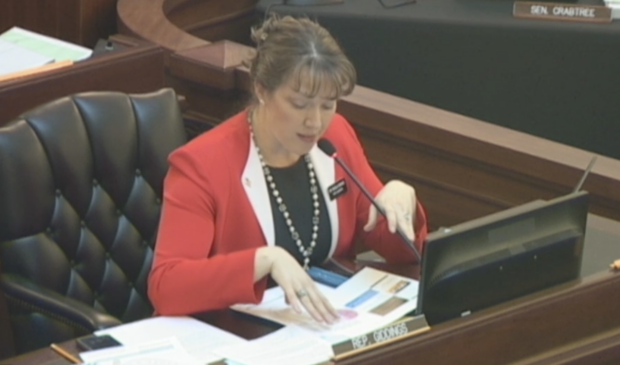After a debate on higher education politics — and legislative process — lawmakers voted down a bill to change budget-writing procedure.
The Joint Finance-Appropriations Committee Friday rejected House Bill 153, which would have required the committee to draw up separate budget bills for the state’s four four-year institutions.
The lopsided voice vote came after JFAC held a rare public hearing — and took testimony from Idahoans who urged the budget-writing committee to rein in social justice programs on the campuses. The vote also came two days after JFAC wrote a systemwide higher ed budget that cut $409,000 from Boise State University’s bottom line, out of frustration with spending at the state’s largest four-year institution.
“Anything can be done within this one budget,” said Rep, Rick Youngblood, R-Nampa, JFAC’s House co-chairman.
Supporters of HB 153 saw it differently.

At more than $600 million, between tax dollars and student tuition and fees, higher education is the fourth-largest budget that goes through JFAC, said Rep. Priscilla Giddings, R-White Bird, HB 153’s sponsor. She pointed out that JFAC has for years split the K-12 budget into several components.
Like Giddings, Rep. Ron Nate decried campus social justice programs, and said budget-writers should rein in public institutions that are “offending Idaho values.”
Said Nate, R-Rexburg: “I would like to be able to hold them accountable with their budget.”
Anna Miller — the education policy researcher at the Idaho Freedom Foundation, a conservative group that has pushed for separate higher education budget bills — decried an overall lack of accountability. The universities have spent money irresponsibly and the State Board of Education hasn’t called them on it, she said. And Miller scolded budget-writers for also failing to stop the spread of social justice programs.
“You haven’t done it,” said Miller, in response to a question from Sen. C. Scott Grow, R-Eagle. “These universities have received no oversight.”
Speaking on behalf of fellow college and university presidents, Kevin Satterlee urged JFAC to reject HB 153. The Idaho State University president called the bill unnecessary — citing JFAC’s decision to cut Boise State’s budget just two days earlier — and said the separate bills could pit the schools against each other, and undermine collaboration within the higher ed system.
“Now is the time to keep us together, rather than separating us,” he said.
The higher education budget bill does earmark funding for the four four-year schools. The State Board of Education, which acts as trustees and regents for the four institutions, has the ability to shift dollars from one institution to another, but this happens infrequently, board Executive Director Matt Freeman told JFAC.
While public testimony ran in favor of HB 153, several lawmakers debated against it.
Rep. Caroline Nilsson Troy, R-Genesee, said oversight of higher ed policy ultimately rests with the State Board.
Like Youngblood, Sen. Jim Woodward, R-Sagle, questioned the wisdom of further splitting up budget bills. “I think we’re in a good spot right now.”
And Sen. Janie Ward-Engelking, D-Boise, said she was discouraged to hear the criticism leveled at Boise State, after Idaho’s universities worked hard to keep their doors open during the pandemic.
“The attacks I’m hearing are a little bit out of place and unjustified right now,” she said.
In the end, only Giddings, Nate, and Idaho Falls Republican Rep. Wendy Horman voted in favor of HB 153.
With that bill dead for the session, the focus on higher education turns to the budget bill itself. This bill must pass both houses. In 2020, the House rejected two higher ed budgets before finally agreeing on a spending plan.
Funding bill for virtual charters heads back to House
It took more than a month, but the Senate finally signed off on a bill Friday designed to cover added costs at two virtual charter schools.
The Senate passed House Bill 22, which could provide an additional $6.1 million to the Idaho Virtual Academy and Inspire Connections charter schools. Amidst the coronavirus pandemic, the two online schools have added thousands of students who left traditional schools — but a state funding cap prevented the schools from receiving full funding for this enrollment influx.
But the Senate struggled with wording on HB 22. The Senate Education Committee discussed the issue on five separate occasions, finally sending the bill to the Senate floor for amendment.
But on Friday, the Senate passed the amended bill without debate, on a 31-2 vote. The bill now goes back to the House, which has to agree to the Senate’s amendments.
The House passed the original bill on Jan. 28.
Extra credit restriction heads to House floor

The House could vote in the next few days on a bill that would prohibit college and university professors from giving students extra credit for voting.
The bill has gone through two rounds of rewrites. And on Friday, Troy said she reworded the bill to make clear that students can still earn college credit for political internships.
With the rewrite, the House State Affairs Committee voted to introduce Troy’s new bill, and send it directly to the House floor for a vote.
Senate passes ‘innovation classrooms’ bill
A bill allowing parents to seek so-called “innovation classrooms” passed the Senate Friday.
Senate Bill 1046 would allow groups of parents, representing at least 24 students, to work with a teacher on an alternative curriculum in math, history, English language arts or science.
Senate Education Chairman Steven Thayn, R-Emmett, called his bill another step to turn public education into “more of a customer service organization,” by giving teachers some negotiating leverage in crafting curriculum.
“This is really about giving parents and teachers a voice,” Thayn said.
The bill passed on a 26-7 vote. It now goes to the House.
Idaho Education News covered Friday’s legislative hearings remotely.
